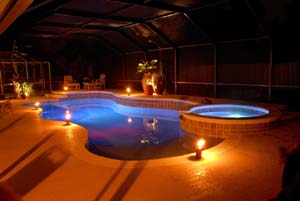Three Types of Swimming Pool Heaters – A Cost-Benefit Analysis
As it gets colder and summer makes way for autumn, many people long for one more swim in the pool or a nice relaxing evening surrounded by water. However, the chill in the air can translate into a freezing-cold swimming pool, which effectively ruins that longing. This is why swimming pool heaters were invented. Just like jumping into cool water in the sweltering heat of summer feels so nice, so too does slipping into a warm pool to escape the nip of fall or winter. There are three major types of swimming pool heaters to choose from to heat up your pool. Each has its pros and cons, its difficulties and its benefits.
The first type, the gas-powered swimming pool heater, requires a propane tank or a natural gas hookup. These are typically used at spas, as they keep the water at a constant temperature. Want 90°F water in the midst of a snowstorm? Gas swimming pool heaters can provide. The principle behind the gas heater is the same as the principle behind your furnace and home heating system – burn the gas and spread the gas heat all over the pool to heat up the water. The only problem with the gas heater is its cost. Aside from the initial steep price, it takes a lot of propane or natural gas to maintain the 85-90°F temperature through the whole pool. That translates to a high cost to your wallet. Still, if you’re willing to spend the money on a daily basis, or if you only heat your pool occasionally, gas heaters are the best you can buy.
The second type, the electric heat pump, is a less expensive and less effective swimming pool heater. If you just want to extend the swimming season a few months, already live in a warm climate, or only want the water a little bit warmer, the electric heat pump is the way to go. Electric swimming pool heaters work by pumping in the surrounding air, heating it up, then transferring that heat directly to the water in the pool. As a result, it can only produce heat that’s slightly warmer than the temperature of the air. Electric heat pumps are typically quite inexpensive, both as an initial purchase and on a daily basis.
The third type of swimming pool heater, the solar heater, uses the sun’s heat to warm your swimming pool. It is also a pump, but instead of heating air to heat the water, it heats the water from the swimming directly by pumping it through a heating device kept warm by constant sunlight. This is far and away the cheapest way to heat the swimming pool, as it doesn’t require gas and only a marginal amount of electricity to pump the pool water through the heater. Of course, the downside to solar swimming pool heaters is that they are only useful on clear, sunny days, during the daytime. Solar heaters are among the cheapest to buy and put together, and are best for the casual pool user who doesn’t need to swim at night or in cloudy weather.
To bring it all together, here are the costs and benefits of each type of swimming pool heater: Gas heaters are the most expensive, most powerful, and most reliable. Electric heat pumps are less expensive and less powerful. Solar heaters are the least expensive, most environmentally friendly, but tend to be unusable in a lot of conditions. Your choice on which swimming pool heater you purchase depends on your climate, your swimming habits, and the amount of money you’re willing to spend.
I am sure this paragraph has touched all the internet people, its really really good paragraph on building up new web Sildenafil. There are certain factors that will contribute to how long Viagra will last for in your individual situation http://pilates-pole.com/fr.html










